Paul Marshall
University of Bristol
Operationalising Rawlsian Ethics for Fairness in Norm-Learning Agents
Dec 19, 2024Abstract:Social norms are standards of behaviour common in a society. However, when agents make decisions without considering how others are impacted, norms can emerge that lead to the subjugation of certain agents. We present RAWL-E, a method to create ethical norm-learning agents. RAWL-E agents operationalise maximin, a fairness principle from Rawlsian ethics, in their decision-making processes to promote ethical norms by balancing societal well-being with individual goals. We evaluate RAWL-E agents in simulated harvesting scenarios. We find that norms emerging in RAWL-E agent societies enhance social welfare, fairness, and robustness, and yield higher minimum experience compared to those that emerge in agent societies that do not implement Rawlsian ethics.
Artificial Intelligence for Collective Intelligence: A National-Scale Research Strategy
Nov 09, 2024



Abstract:Advances in artificial intelligence (AI) have great potential to help address societal challenges that are both collective in nature and present at national or trans-national scale. Pressing challenges in healthcare, finance, infrastructure and sustainability, for instance, might all be productively addressed by leveraging and amplifying AI for national-scale collective intelligence. The development and deployment of this kind of AI faces distinctive challenges, both technical and socio-technical. Here, a research strategy for mobilising inter-disciplinary research to address these challenges is detailed and some of the key issues that must be faced are outlined.
Data Ethics Emergency Drill: A Toolbox for Discussing Responsible AI for Industry Teams
Mar 15, 2024

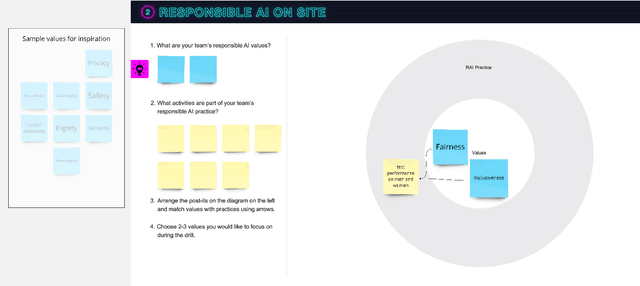
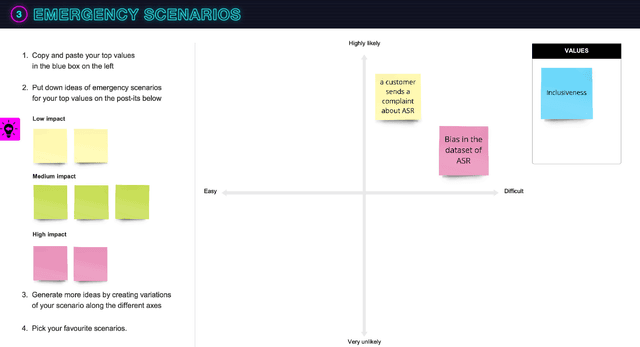
Abstract:Researchers urge technology practitioners such as data scientists to consider the impacts and ethical implications of algorithmic decisions. However, unlike programming, statistics, and data management, discussion of ethical implications is rarely included in standard data science training. To begin to address this gap, we designed and tested a toolbox called the data ethics emergency drill (DEED) to help data science teams discuss and reflect on the ethical implications of their work. The DEED is a roleplay of a fictional ethical emergency scenario that is contextually situated in the team's specific workplace and applications. This paper outlines the DEED toolbox and describes three studies carried out with two different data science teams that iteratively shaped its design. Our findings show that practitioners can apply lessons learnt from the roleplay to real-life situations, and how the DEED opened up conversations around ethics and values.
JAMMIN-GPT: Text-based Improvisation using LLMs in Ableton Live
Dec 06, 2023
Abstract:We introduce a system that allows users of Ableton Live to create MIDI-clips by naming them with musical descriptions. Users can compose by typing the desired musical content directly in Ableton's clip view, which is then inserted by our integrated system. This allows users to stay in the flow of their creative process while quickly generating musical ideas. The system works by prompting ChatGPT to reply using one of several text-based musical formats, such as ABC notation, chord symbols, or drum tablature. This is an important step in integrating generative AI tools into pre-existing musical workflows, and could be valuable for content makers who prefer to express their creative vision through descriptive language. Code is available at https://github.com/supersational/JAMMIN-GPT.
Model-Based Reinforcement Learning for Type 1Diabetes Blood Glucose Control
Oct 13, 2020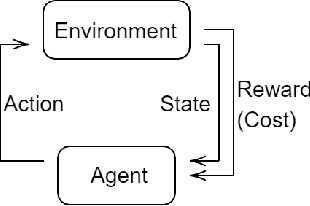
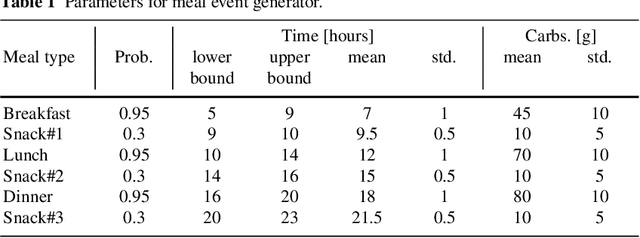

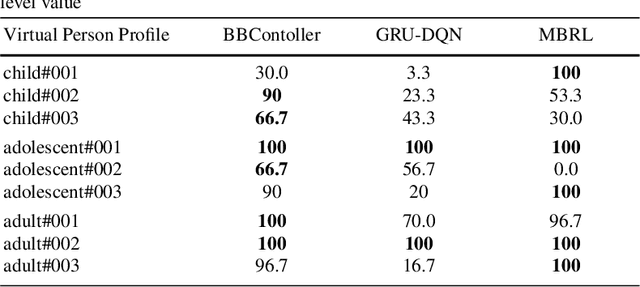
Abstract:In this paper we investigate the use of model-based reinforcement learning to assist people with Type 1 Diabetes with insulin dose decisions. The proposed architecture consists of multiple Echo State Networks to predict blood glucose levels combined with Model Predictive Controller for planning. Echo State Network is a version of recurrent neural networks which allows us to learn long term dependencies in the input of time series data in an online manner. Additionally, we address the quantification of uncertainty for a more robust control. Here, we used ensembles of Echo State Networks to capture model (epistemic) uncertainty. We evaluated the approach with the FDA-approved UVa/Padova Type 1 Diabetes simulator and compared the results against baseline algorithms such as Basal-Bolus controller and Deep Q-learning. The results suggest that the model-based reinforcement learning algorithm can perform equally or better than the baseline algorithms for the majority of virtual Type 1 Diabetes person profiles tested.
 Add to Chrome
Add to Chrome Add to Firefox
Add to Firefox Add to Edge
Add to Edge